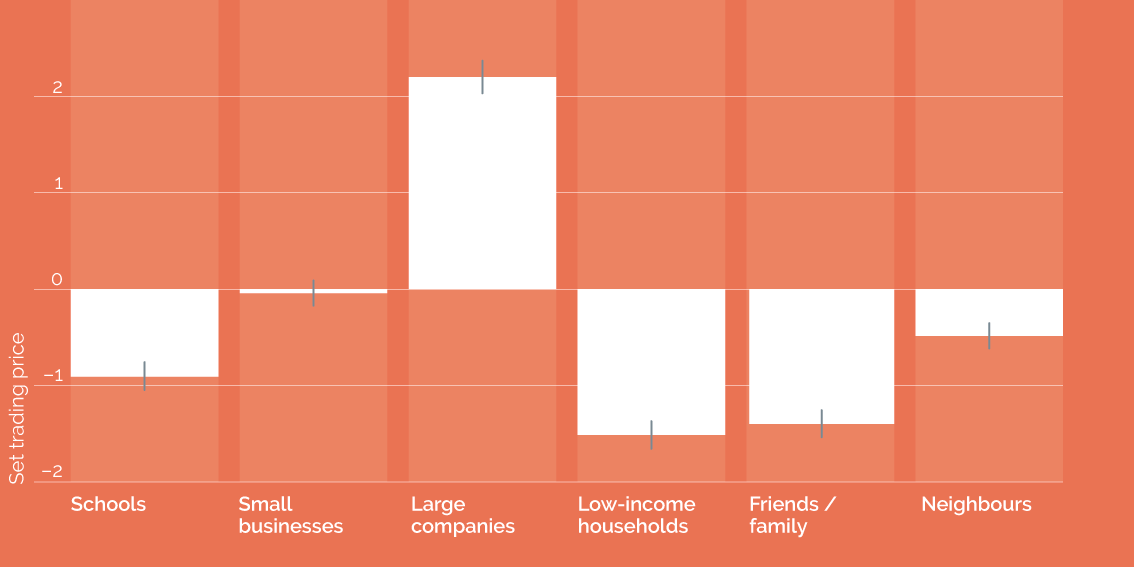Peer-to-peer buying and selling of electricity could mean bill savings – but it depends on who you know and where you live.
New research indicates that peer-to-peer ways of buying and selling electricity could mean bill savings – but it depends on who you know and where you live.
Do you know anyone with solar panels? If so, you may be in line for “mates’ rates” on your electricity. According to research I conducted with colleague Ulf Hahnel (University of Geneva), people are prepared to offer a discount to friends and family when given the option to sell them excess solar power.
We asked around 440 participants in each of Germany and the UK to set default prices in a fictional scheme for trading. They could set prices for these groups: local schools and hospitals; small local businesses; multinational businesses headquartered locally; local low-income households; friends and family; and near neighbours.
Across both countries, people were prepared to offer discounts approaching £0.02/€0.02 per unit of electricity to low-income households, and friends and family. A more modest discount was extended to schools and hospitals, and neighbours, with no discount offered to small businesses. A substantial premium was charged to large businesses.

Interestingly, the size of discounts offered varied with other traits. Those who described themselves as politically left wing mostly offered larger discounts all round, as did those who express greater concern about climate change. Sometimes, like in the case of low-income households, level of trust in the particular group didn’t make a big difference to discount offered – while in the case of friends and family, it did.
So, in general, we see a pattern of readiness to offer discounts across most groups. But these findings potentially have distributional impacts. If you don’t have friends and family with their own generation, you may be less likely to get access to this kind of discount. And if you live in an area with more people who identify as right wing, you are similarly less likely to experience these benefits.
These findings were the same across independent sets of participants in Germany and the UK. However, there was a difference which suggests that country context can also be important. As part of the scenario, we told some participants that their price choices would remain private, while we told others that their choices would be made public. While there was little difference between countries when choices were private, when they were made public, UK participants both offered and asked for significantly smaller discounts. More research is required to explore differences of this kind.
What does this mean for future energy costs?
At the time of the research, a £0.02 discount was roughly equal to a 10% cut to unit cost in the UK. If an average UK household were able to meet a quarter of their demand at this rate (i.e. using excess solar sold to them at mates’ rates), they might expect to save about £20 per year at today’s prices. This has potential to be larger if electricity prices go up, if people use more electricity (e.g. for heating and transport), if people can time their consumption to use more excess local electricity, and where larger discounts are offered.
So while bill impacts of the differences we observed could be fairly modest, they do reinforce the importance of anticipating the wider systemic impacts of increasing granularity with which we may come to buy and sell electricity. This kind of arrangement is of increasing interest because it could encourage more local consumption of local generation, helping manage the grid, and also support more investment in renewable generation.
Our results show a welcome readiness to subsidise services and households in need. But when savings opportunities depend on individuals’ choices, rather than being socialised through other mechanisms (such as taxation), there is greater risk that some who may have a greater need of savings miss out. As well as increasing inequalities, this risks undermining public support for the net-zero transition.
Policymakers and service providers will need to consider if and how to set this against the potential benefits that such arrangements could have in terms of uptake of the low carbon energy technologies needed to address climate change.
Publication details
Hahnel, U.J.J. and Fell, M.J. 2021. Pricing decisions in peer-to-peer and prosumer-centred electricity markets: Experimental analysis in Germany and the United Kingdom. Renewable and Sustainable Energy Reviews, 162: 112419. doi: 10.1016/j.rser.2022.112419Opens in a new tab.
Banner photo credit: Chuttersnap on Unsplash



